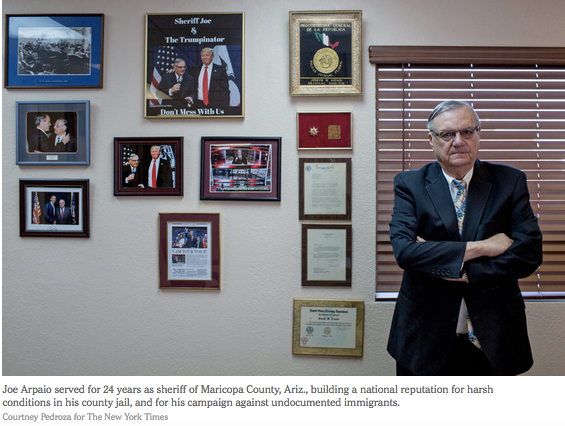Mr. Arpaio had touted himself as “America’s toughest sheriff,” making inmates wear pink underwear and serving jail food that at least some prisoners called inedible. He was also at the forefront of the so-called birther movement that aimed to investigate President Barack Obama’s birth certificate.
The criminal conviction grew out of a lawsuit filed a decade ago charging that the sheriff’s office regularly violated the rights of Latinos, stopping people based on racial profiling, detaining them based solely on the suspicion that they were in the country illegally and turning them over to the immigration authorities.
A federal district judge hearing the case ordered Mr. Arpaio in 2011 to stop detaining people based solely on suspicion of their immigration status, when there was no evidence that a state law had been broken. But the sheriff insisted that his tactics were legal and that he would continue employing them.
He was convicted last month of criminal contempt of court for defying the order, a misdemeanor punishable by up to six months in jail.
The pardon was swiftly condemned on Twitter by Democrats in Congress as “outrageous and completely unacceptable” and a “disgrace.”
Its timing also raised eyebrows, coming on the eve of Hurricane Harvey, a Category 4 storm, barreling down on coastal Texas. Senator Chuck Schumer, Democrat of New York and the minority leader, accused Mr. Trump of “using the cover of the storm” to pardon Mr. Arpaio and to issue a formal ban on transgender people from joining the military. (The ban also gives the secretary of defense wide latitude to decide whether currently serving transgender troops should remain in the military.)
Trump Asked Months Ago if Arpaio Case Could Be Dropped, Officials Say
During a wide-ranging meeting, the officials said, Mr. Trump asked both Jeff Sessions, the attorney general, and Donald F. McGahn II, the White House counsel, what the options were for helping Mr. Arpaio, a longtime supporter who had been charged with defying a court order directing him to stop detaining people solely on the suspicion that they were undocumented immigrants.
Mr. McGahn and Mr. Sessions both promptly told the president that the case could not be dropped and the charges wiped away, according to the officials, who spoke on the condition of anonymity because they were not authorized to speak publicly about Mr. Trump’s private conversations. Mr. Trump then asked about other options, including his power to pardon Mr. Arpaio if he was convicted. He was told he had broad pardon powers, and was satisfied with that answer, the officials said. Mr. Arpaio was ultimately convicted last month, and Mr. Trump pardoned him before he was sentenced.




